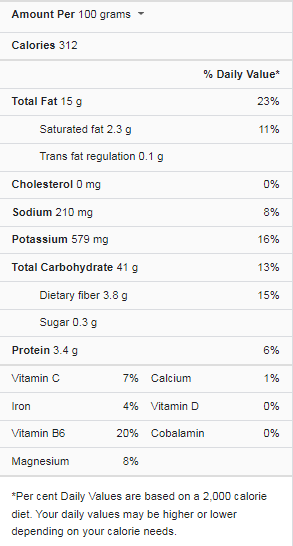French fries are a staple side dish in many fast food restaurants, burger joints, and American homes. Although you may create the salty snack from scratch with raw potatoes, your favorite oil, and seasoning, many home cooks prefer to use frozen fries.
Artificial flavors, rice flour, and corn starch may also be present in commercially processed frozen french fries. Even though potatoes, the principal ingredient in french fries, are a low-calorie, low-fat food, generally, french fries are frequently high in fat, calories, and sodium. If you include french fries in your diet, it’s a good idea to consume them in moderation or to prepare them in a way that reduces their sodium and fat content.
What are French Fries?
French fries, sometimes Pommes frites, are pretty standard in French restaurants. However, there is some debate about where the phrase originated in America. In the cooking world, frenching is the process of slicing food into long strips.
Have you ever had French-cut green beans? The only distinction is that potato is used to make French fries. One way of thinking is as follows. The alternative theory asserts that Thomas Jefferson brought the fried potato to America after discovering it in Paris. There is little doubt that the French fry originated in America. Still, those who hold this opinion believe the name was inspired by the country where Thomas Jefferson first tasted fried potatoes.
French fries are served as a side dish with burgers, fried chicken, steak, and fish. There are regional variations of the globally renowned potato fritters. Eating fries with grilled mussels or a fried egg is standard in Belgium. In the UK, fish and chips are well-known.
French Fries Nutrition Facts
Health Benefits of French Fries
The nutrients in the potatoes are probably the health advantages of eating french fries. Standard fries’ oil and spices may not provide significant benefits and may even have disadvantages. Any health advantages from eating fries must be weighed against the risks of consuming too much salt and fat.
May Support Healthy Immune Function
Potato vitamin C may have health benefits for the body. A robust immune system requires vitamin C, a water-soluble nutrient. Additionally, it aids in the development of sturdy connective tissue and wound healing. Vitamin C must be absorbed through food because the body cannot store it. The vitamin is present in white potatoes, but better sources include citrus fruits and several dark green vegetables.
May Improve Early Brain Development
Potatoes include vitamin B6, which is necessary for healthy brain growth in fetuses and infants. In actuality, adult men and women should consume more vitamin B6 than pregnant and nursing women (who are not pregnant or breastfeeding). B6 is present in potatoes and other starchy vegetables, but if you eat french fries, you can also get fat and sodium in addition to the nutrient. Poultry, organ meats, and fish are additional sources of vitamin B6.
May Reduce Oxidative Stress
Carotenoids, anthocyanins, chlorogenic and caffeic acids, among others, are antioxidants found in potatoes.3 Antioxidants can aid in repairing cells damaged by oxidative stress, which can be a factor in many chronic diseases. White potatoes may be a substantial source of antioxidants in the typical American diet, despite other fruits and vegetables offering higher amounts of antioxidants. This is because white potatoes are so extensively consumed in the United States.
May Promote Weight Maintenance
White potatoes include resistant starch and fiber, which some studies claim may have health benefits. They claim that good carbohydrates can help prevent weight gain. In one study, researchers discovered that french fries contain more resistant starch than boiled potatoes. 6 In some people, resistant starch may increase satiety since it passes through the small intestine undigested. It is crucial to remember that while potatoes and french fries may provide resistant starch and fiber (in the skin), they are also a source of calories, sodium, and fat. This depends on how they are prepared.
Low-Cost Source of Nutrients
Even though this starchy crop is frequently criticized for having little nutritional value compared to other vegetables, several researchers have backed the use of white potatoes in the diet. White potatoes are a cheap source of essential nutrients, high-quality protein, and a filling carbohydrate, the authors of one research, remind readers. 8 Of course, buying or eating french fries at a restaurant or fast food drive-through will not be as inexpensive as making your own. Fresh potatoes can be used to make low-salt, baked french fries that will give your family more vitamins and minerals than some other everyday side dishes.
Supports Digestion
The body needs phosphorus to make digestion easier. Niacin and riboflavin are necessary for the metabolic transfer of energy to the nervous and emotional systems. It controls healthy bowel motions and aids in treating indigestion, diarrhea, and constipation, and improves intestinal wellness.
Lowers cholesterol
High niacin intake helps to raise good cholesterol levels and reduce harmful cholesterol levels. It stops diseases like atherosclerosis and the hardening of arterial walls.
How to Prepare French Fries?
Making french fries at home in the oven is the ideal method to enjoy them and benefit from the health advantages of potatoes. By doing so, you may regulate the contents and get rid of extra fat and sodium. There are various techniques you can employ.
White Russet potatoes are a common choice among chefs, but you can also try sweet potatoes or other types. White potatoes have the most significant starch and provide french fries with their most recognizable flavor. To benefit from the added nutrients, leave the skins on.
Cut the potatoes into quarter-inch-wide strips and place them in cool water to prevent them from becoming brown. Once they have all been cut into slices, spread them out on a towel to dry. They can be placed in a bowl with some egg whites or a sprinkle of olive oil. Several chefs substitute egg white for oil to reduce the amount of fat and make the fries crispier.
Put the potatoes on a baking sheet that is either nonstick or has been sprayed with nonstick spray. Sprinkle salt on top. At about 425 degrees, bake. To prevent the egg white from burning, if you use it in place of oil, you might need to reduce the baking temperature to 375 degrees. Usually, it takes 30 to 40 minutes for the fries to become crispy.
If you want to reduce sodium intake, think about flavoring your fries with something other than salt. Among many cooks, paprika, basil, garlic powder, and Italian spice are favorites. Check it carefully if you’re using a spice blend because many contain salt.
Can I Eat Fries on a Diet?
French fries and potato chips are not healthful or filling alternatives to whole potatoes, and they contain a lot of calories, and it is simple to consume too many. Consuming potato chips and French fries have been connected to weight increase in observational studies.
A weekly serving or fewer would probably have no impact on your health, and portion size is essential. This study did not specify an “official” serving of french fries, which contains 10 to 15 individual fries and 130–150 calories. An increase of over 3 pounds resulted from eating extra french fries.
The number of refined grains and desserts consumed increased weight by nearly half a pound. Contrarily, throughout four years, consuming more vegetables, whole grains, fruits, nuts, and yogurt was associated with weight loss.
Why are French Fries Called French?
When the river froze in the winter, the fish-starved people turned to fried potatoes. According to legend, American soldiers serving in Belgium during World War I found this dish and gave the excellent potatoes the name “French” fries because southern Belgium is a French-speaking region. French fries are not French, despite their name and widespread use.
The origins are believed to be in Belgium, where historians assert that potato frying first appeared in the late 1600s. According to Belgian folklore, the Meuse Valley’s underprivileged villagers frequently consumed little fried fish they had caught in the river.
According to legend, American soldiers serving in Belgium during World War I came across this dish and named the delectable potatoes “French” fries because the language spoken there is French. Jefferson brought a recipe for Pommes de Terre frites a cru en petites tranches, or “deep-fried potatoes in small slices,” back to America from France. The earliest American mention of this now-ubiquitous meal may be found in his notes from the President’s residence.
Are French Fries Good for Weight Loss?
French fries and potato chips are not healthful or filling alternatives to whole potatoes, and they contain a lot of calories, and it is simple to consume too many. Consuming potato chips and French fries have been connected to weight increase in observational studies.
Consuming potatoes may not result in weight gain if you usually maintain a healthy diet and avoid overindulging in lousy food. Because they have a rich nutritional profile, potatoes, both white and sweet potatoes, might aid in weight loss.
Fries include a lot of trans fat since they are deep-fried in hydrogenated oils, which raises your bad cholesterol and lowers your good cholesterol. You will significantly increase your risk of developing heart disease due to this.
The connection is not statistically significant at lower ingestion levels, and the strongest correlations are found at consumption levels of three or more times per week of fried potatoes. The lesson in this is moderation. Make french fries an occasional treat if you love them.
Will I Get Fat if I Eat French Fries Every Day?
You should anticipate high salt and fat intake if you eat French fries daily. French fries are a significant source of calories, salt, and saturated fat. A more than doubled risk of death was linked to eating French fries more than twice each week. The results persisted even after controlling for obesity, physical activity, smoking, and alcohol intake (as indicated by study participants when they enrolled). The Harvard T.H. Chan School of Public Health’s Eric Rimm advises severely reducing the consumption of french fries.
Dr. Rimm is so convinced of the harmful effects of eating deep-fried potatoes on your health that he advises you to limit yourself to just six fries whenever you go out. While the main component of french fries, potatoes, is a low-calorie, low-fat food, overall, french fries tend to be high in fat, calories, and sodium. It’s a good idea to consume french fries in moderation or to cook them using a way that lowers the sodium and fat content if you include them in your diet.
Conclusion
French fries should be consumed as soon as they are cooked to maintain their texture. According to the USDA, fries lose quality if they are refrigerated. Frozen french fries keep their freshness for up to a year when stored in the freezer. French fries are usually made with white Idaho potatoes, but some take them home with Yukon, sweet, or other potatoes.
Whether you buy frozen, professionally processed french fries or eat fast food or restaurant french fries, the nutritional content of french fries may vary. Long, deep-fried potato slices are referred to as “fries.” It is either soft or crispy when it arrives hot. It can be had as a snack, lunch, or dinner. It was accessible on all menus.



